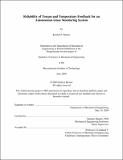Reliability of torque and temperature feedback for an autonomous glass monitoring system
Author(s)
Becker, Kaitlyn P. (Kaitlyn Patricia)
DownloadFull printable version (4.389Mb)
Other Contributors
Massachusetts Institute of Technology. Dept. of Mechanical Engineering.
Advisor
Barbara Hughey.
Terms of use
Metadata
Show full item recordAbstract
Automated pipe turners used in glassblowing studios are limited in their application by the duration a blown glass piece can be left unattended. An autonomous monitoring system can increase the usefulness of pipe turners in small studio and hobby settings, enabling glassblowers to work more independently. An initial feasibility study for an autonomous system has been performed by using two parameters, temperature measured by an IR thermometer and torque measured via the current drawn by a dc motor, to monitor glass blown objects during their production. The intended use of the system is for a glassblowing-pipe turning machine designed to keep a blown glass object centered about its axis of rotation and to keep the object heated within a set temperature range. Temperature data was collected with a handheld IR thermometer for static and rotating samples with varying color additives and optic qualities. Some variation and noise was present in the temperature data, but the results were consistent enough to be readily implemented in an automated monitoring system. Torque feedback was monitored by recording the variation in current drawn by a dc motor that was mounted in a drive system to turn a glassblowing pipe. When a pipe carrying a misaligned piece was inserted in the drive system the data showed a recognizable oscillation corresponding to the varying torque due to gravitational forces on the rotating blown glass piece. This confirms that using the current drawn by the motor as alignment feedback will be feasible in an autonomous pipe turner. (cont.) This work can now be extended to modify the drive system that was used for testing to allow control of the axial position of the pipe and to integrate a digital micro controller which will be programmed to use the temperature and torque feedback to control the drive system.
Description
Thesis (S.B.)--Massachusetts Institute of Technology, Dept. of Mechanical Engineering, 2009. This electronic version was submitted by the student author. The certified thesis is available in the Institute Archives and Special Collections. Cataloged from student submitted PDF version of thesis. Includes bibliographical references (p. 30).
Date issued
2009Department
Massachusetts Institute of Technology. Department of Mechanical EngineeringPublisher
Massachusetts Institute of Technology
Keywords
Mechanical Engineering.